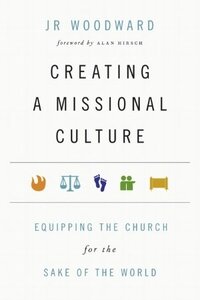J. R. Woodward, Creating a Missional Culture: Equipping the Church for the Sake of the World. IVP Books, 2012.
Referenced in:
LifeandLeadership.com Summary
Much of the literature on leading missional communities is heavily conceptual. This is helpful, but when leaders start new missional efforts or seek to transition established churches into a missional mindset, there are few practical guides. This book fills the practical gap.
Woodward’s chief contribution is in describing how to shape a missional congregational culture, particularly in how the various currencies of leadership contribute to this. It is excellent alongside Hirsch’s The Forgotten Ways as a way of enculturating the A.P.E.S.T. model. Also, see related materials from the Ministry Resource Guide on Congregational Culture/Church Identity.
In Part 1: The Power of Culture, he discusses the six characteristics that shape culture, both the culture that surrounds us and the congregational cultures we create. This “cultural web” consists of “the language we live in, the artifacts we use, the rituals we engage in, our approach to ethics, the institutions we are a part of, and the guiding narratives that we listen to” (32) (see Schein, Organizational Culture and Leadership to expand on this).
Next, Woodward describes the kind of environment where each of these six dimensions may become more intentionally missional: learning, healing, welcoming, liberating, and thriving. He then shows how leadership must be polycentric to accomplish this. Polycentric leadership is neither hierarchical nor flat, but recognizes “many centers of leadership that interrelate.” This is best suited to “cultivating a fruitful missional ethos that fully activates the priesthood of all believers.” (60)
In Part 2: A Leadership Imagination that Shapes Missional Culture, he argues that part of the effectiveness of polycentric model is its fit with five cultural megashifts:
- Media shift from print and broadcast to the digital age
- Philosophical shift from modernity to postmodernity
- Science shift from classical science to emergent science
- Spatial shift from rural to urban
- Religion shift from Christendom to post-Christendom
He follows this with the importance of leaders hearing the story, deepening theological roots, embracing emotional health, and relinquishing the need to control.
In Part 3: The Five Culture Creators, Woodward considers how leaders contribute to culture formation, developing more fully the “equippers” as listed in Ephesians 4:
- Apostles – Dream awakeners
- Prophets – Heart revealers
- Evangelists – Story tellers
- Pastors – Soul healers
- Teachers – Light givers
He describes each of these in terms of their concerns, passions, weaknesses, and effects. This is one of the most thorough developments of the A.P.E.S.T. model available.
This is an excellent, practical guide for those wishing to enculturate a missional DNA in their congregations.
Publisher’s Description
Once upon a time, Moses had had enough.
Exhausted by the challenge of leading the Israelites from slavery to the Promised Land, Moses cried out to God, “What have I done to displease you that you put the burden of all these people on me? … If this is how you are going to treat me, please go ahead and kill me” (Exodus 11:11, 15).
If that sounds hauntingly familiar to you, you may be the senior pastor of a contemporary church. The burden of Christian leadership is becoming increasingly unbearable—demanding skills not native to the art of pastoring; demanding time that makes sabbath rest and even normal sleep patterns seem extravagant; demanding inhuman levels of efficiency, proficiency and even saintliness.
No wonder pastors seem and even feel less human these days. No wonder they burn out or break down at an alarming rate; no wonder the church is missing the mark on its mission.
About the Author
JR Woodward is a church planter, activist, consultant, missiologist, speaker and writer. Graduating with a master of arts in global leadership from Fuller Theological Seminary, Woodward went on to co-found Kairos Los Angeles, a network of neighborhood churches in the Los Angeles area.
He also cofounded and is now director of the Solis Foundation, a faith-based foundation that partners with churches in third-world countries to equip new entrepreneurs through small business, micro-loan programs and venture grants. Woodward previously published ViralHope with Ecclesia Press in 2010. Follow his blog at www.jrwoodward.net.
Alan Hirsch is the founding Director of Forge Mission Training Network. He is the co-founder of shapevine.com, an international forum for engaging with world transforming ideas. He leads Future Travelers, a learning journey applying missional-incarnational approaches to established churches and is an active participant in The Tribe of LA, a Jesus community among artists and creatives in Los Angeles.
Known for his innovative approach to mission, Hirsch is a teacher and key mission strategist for churches across the western world. His popular book The Shaping of Things to Come (with Michael Frost) is widely considered to be a seminal text on mission. Alan’s recent book The Forgotten Ways, has quickly become a key reference for missional thinking, particularly as it relates to movements. His book ReJesus is a radical restatement about the role that Jesus plays in defining missional movements. Untamed, his latest book (with his wife Debra) is about missional discipleship for a missional church.
His experience in leadership includes leading a local church movement among the marginalized as well as heading up the Mission and Revitalization work of his denomination. Hirsch is an adjunct professor at Fuller Seminary and lectures frequently throughout Australia, Europe, and the U.S.
***For additional information on this resource, including reviews, click the bookstore links. Check the reference at page top or the links below for resource guides on related topics.***
See Resources on Over 100 Areas of Ministry Leadership:


